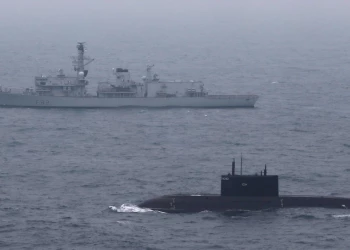28 Apr 11
The Warrant Officer responsible for organising the lining of the processional route at tomorrow's Royal Wedding, made up of over 1,000 military personnel, has been presented with a historic Warrant Officers' badge, approved by Her Majesty The Queen.
Garrison Sergeant Major William Mott marks out positions along the royal procession route with his Warrant Officer's pace stick [Picture: Harland Quarrington, Crown Copyright/MOD 2011]
Garrison Sergeant Major William Mott, the senior Warrant Officer of the British Army, has been responsible for some of the most spectacular state ceremonial events over the last decade.
Mr Mott has been in his current post as Garrison Sergeant Major (Warrant Officer Class 1) London District since July 2002. Officially responsible for state ceremonial duties, he has been involved in nearly every large-scale ceremonial event in London, and his job has taken him as far afield as Sri Lanka, Jamaica, Malaysia and Jordan in the organising of events.
As the post of Garrison Sergeant Major is traditionally a Court Appointment, the new badge has been approved especially by Her Majesty The Queen.
The badge revives the original one made for Sergeant Majors appointed to the Court of King William IV in the early 19th century. It incorporates the Royal Coat of Arms worn by selected Warrant Officers Class 1 of The Household Division, placed over four chevrons sewn in gold thread, the traditional badge of the Sergeant Major, originally worn on both arms of their tunics.
Mr Mott has received the badge in advance of one of his biggest jobs to date, the Royal Wedding of His Royal Highness Prince William and Catherine Middleton on 29 April.
Master Tailor Warrant Officer Class 2 Shield sews Garrison Sergeant Major William Mott's new badge of rank onto his regimental tunic in time for the Royal Wedding [Picture: Sergeant Dan Harmer, Crown Copyright/MOD 2011]
His responsibilities include organising the lining of the processional route with over 1,000 troops from the Foot Guards Regiments, the Royal Navy and Royal Marines, and the Royal Air Force and their Bands.
Mr Mott has been seen regularly in the weeks in advance of the wedding day, marking out positions along the route with his Warrant Officer's pace stick. He said:
"It is a great honour for me as Garrison Sergeant Major London District that Her Majesty has approved the reinstatement of this historic badge.
"I am continually humbled by the privileges which my appointment affords me, and the 'big badge' will be worn on my tunic with as much pride as I have worn every badge of rank in my Army service. That it is being worn for the first time in nearly 200 years for the Royal Wedding in the presence of Her Majesty makes it even more gratifying."
Garrison Sergeant Major Mott enlisted into the 1st Battalion Welsh Guards in April 1979, and has served with his unit in Belize, Canada, Cyprus, France, Germany, Kenya and the USA. He has completed operational tours of Northern Ireland and served in the Falklands during the 1982 conflict.
Garrison Sergeant Major William Mott goes through plans for the Royal Wedding in his office at Horseguards in London [Picture: Harland Quarrington, Crown Copyright/MOD 2011]
Alongside operational duties, he has served as an instructor at the Guards Depot as a Lance Sergeant, and at Royal Military Academy Sandhurst as a Colour Sergeant, a Company Sergeant Major and College Regimental Sergeant Major. He was Garrison Sergeant Major at Headquarters Northern Ireland prior to assuming his present appointment as Garrison Sergeant Major London District.
The post of Garrison Sergeant Major London District was established in the early 1950s with specific responsibilities as State Ceremonial Sergeant Major. The first task of the new Garrison Sergeant Major was to organise the funeral of King George VI in 1952 and the coronation of Her Majesty The Queen in 1953. There have since been five individuals who have held the post, including William Mott.
More than 1,300 personnel from across the Armed Forces will be playing a key role in the ceremonial elements of the Royal Wedding. This includes guard duties, lining the ceremonial route, musical support through ceremonial bands, and a spectacular seven-aircraft flypast from the RAF Battle of Britain Memorial Flight and two Tornado and two Typhoon fast jets.





















